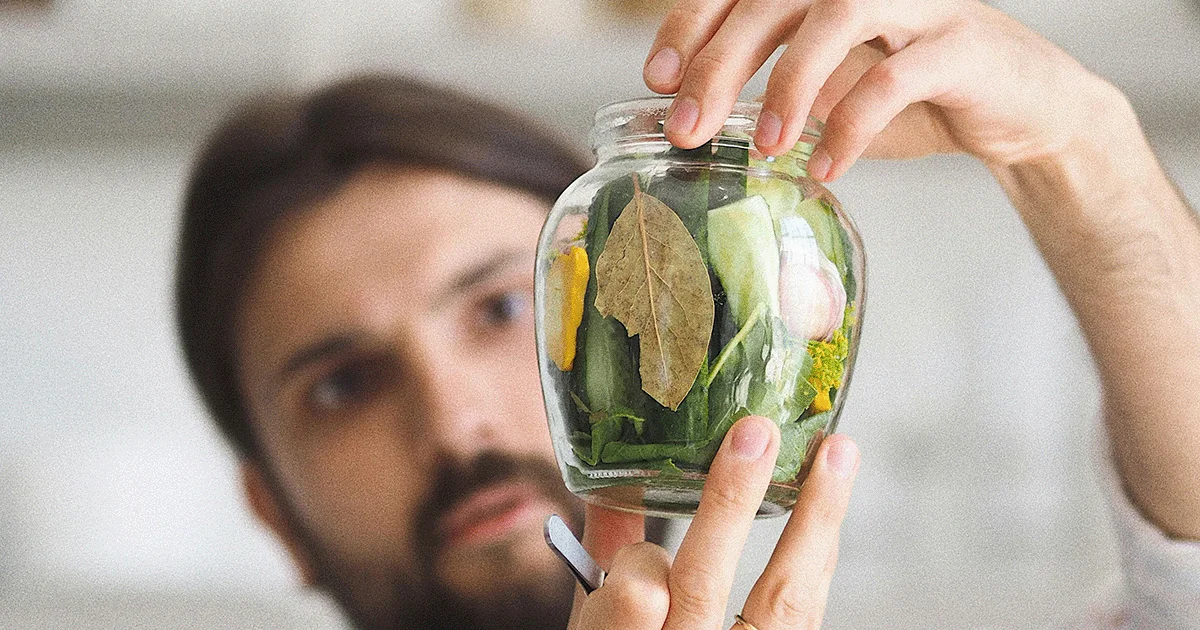Here's what we'll cover
Here's what we'll cover
If beauty's in the eye of the beholder, medicine is in the tastebuds of the one trying to swallow it. Just as there are foods some people love and others hate, so, too, there are herbal medicines with mixed reviews when it comes to flavor. That appears to be the case for ashwagandha tea due to the herb's unique smell and taste.
But is ashwagandha tea effective at what companies claim it can do? We've gathered everything you ever wanted to know about what ashwagandha is supposed to do, and most importantly, whether it works.
What is ashwagandha?
Ashwagandha, or Withania somnifera, is an herb that some believe to be an adaptogen used for millennia in Indian and African traditional medicine. Adaptogens are purported to be substances that help the body deal with a diverse range of things, from infectious disease to pollution, radiation, and "interpersonal disharmony" (Liao, 2018). Traditional practices like Ayurveda used the root and berries of ashwagandha—also known as winter cherry or Indian ginseng—to treat a wide range of health conditions, and modern research has found evidence to support some of these claims.
Research is limited on the benefits of this plant, but we're learning more about this supplement each year. While scientific studies have yet to confirm all of the claims made for the supplement, it remains overwhelmingly popular and can be found in various forms.
It's important to remember: You should always consult your healthcare provider before beginning a new supplement regimen. They can advise you based on your individual health status and concerns regarding whether this Ayurvedic herb may be helpful and if there are any potential concerns you should be aware of, some of which we'll cover here.
What forms does ashwagandha come in?
We weren't kidding about the wide variety of forms you'll find. Ashwagandha is available as pills, capsules, powders, extracts, elixirs, and teas, and all of these are available at health stores and online.
Although you can find ashwagandha extract in teas and tinctures, there's a reason you'll mostly see capsules and pills: The word ashwagandha is Sanskrit for "smell of the horse," and references the herb's ability to increase strength as well as its unique smell.
Those familiar with the herb say that the aroma is most intense when consumed in powder or tea form but more palatable as a capsule or tablet.
What you need to know about ashwagandha tea
You can blend ashwagandha powder into hot beverages or smoothies, but you may need to experiment with ingredients to mask the supplement's unique flavor and smell profile.
Ashwagandha teas may be harder to swallow because they're typically not mixed with anything. Customer reviews of teas made up of just ashwagandha do show that some people struggle with the taste, though others report that the smell is the only part that bothered them. Some specialized tea companies have created tea blends that include ashwagandha and other herbs believed to help with relaxation, which may help mask the flavor. You might find the herb mixed with tulsi (another adaptogen), dandelion, turmeric, or licorice root.
Traditionally, Ayurvedic treatments used the whole, dried root, which was turned into a powder and usually steeped in milk. But this is different from using Withania somnifera as a tea. Powders are dried and pulverized parts of the actual plant, which means you're getting all the active compounds in the same proportions as you’d find in nature.
Teas use dried parts of the plants steeped in water, so the amount of active compounds you get depends on how much is extracted into your mug. The temperature of the water and length of time you allow the tea bags to steep affect this, as does the choice of which parts of the plant are used to make the tea.
But ashwagandha supplements can be made from the plant’s root, leaves, or a combination of the two—these variations aren't necessarily equivalent. Studies have shown that the leaves and roots of Withania somnifera have different concentrations of withanolides. The roots are the most studied source of these health-boosting compounds, but the leaves are a more economical option for inclusion in supplements (Kaul, 2016).
Quality can be hard to determine
The vast differences in how much ashwagandha is in any supplement form lead to a unique problem in this part of the supplement industry. Researchers have found that companies mix leaves and stems of ashwagandha into their root powders without declaring that on the label.
A study looking at over 100 ashwagandha powders and roots found that only about 77% were pure ashwagandha—the rest had other plants mixed into the product (Amritha, 2020).
Companies using the plant in their tea may be doing the same, but this has yet to be tested. Companies making ashwagandha tea with other ingredients may also label them as "proprietary blends," so there's no way to know how much of this Ayurvedic herb is actually being used in the formula of these herbal teas. Even if this mixing of plant parts doesn't decrease the content of the beneficial parts of the plant, that does mean that the consumer may not be getting what they think they're paying for.
Additionally, most research on ashwagandha has been done on root extracts, so we know less about the effects extracts from leaves, stems, and flowers may have.
What else is ashwagandha used for?
Ashwagandha root is considered a drug of "Rasayana," a Sanskrit word that translates to "path of essence," and a practice of Ayurvedic medicine that refers to the science of lengthening a person's lifespan. Research on ashwagandha paces behind its use in herbal medicine, but science has confirmed some potential health benefits from clinical trials.
In fact, research shows that ashwagandha supplements such as powders and teas have potential benefits that touch many body systems. This Ayurvedic herb may reduce blood sugar levels, decrease inflammation, and help lower cholesterol. It may help both the mind and body by potentially lowering cortisol levels, reducing anxiety and depression, improving sleep, and increasing muscle mass and strength. For men specifically, this supplement may boost testosterone levels and may even boost male fertility by increasing sperm count (Mandlik Ingawale, 2021).
The potential benefits of this plant are thought to come from compounds such as withanolides (the most well-known of which is withaferin A), glycowithanolides (which boast antioxidant properties), and alkaloids (Mandlik Ingawale, 2021).
Potential side effects of ashwagandha
It's important to note that clinical studies on ashwagandha have been conducted using extracts and pills. Studies have not been specifically conducted on the effects of ashwagandha tea. So, though research on the effects of this adaptogenic herb in humans shows remarkably low side effects rates, we cannot speak with certainty about the potential side effects of these teas.
Side effects of the herb tend to be mild. A review of five studies on ashwagandha that included over 150 participants found the supplement well-tolerated and noted high compliance and low dropout among subjects (Pérez-Gómez, 2020).
Studies looking at people who experienced adverse effects from ashwagandha note nasal congestion (rhinitis), constipation, cough and cold, drowsiness, decreased appetite, increased appetite, and increased libido (Chandrasekhar, 2012; Raut, 2012).
Additionally, there's little to no regulation on the composition of these teas. That means ingredients and dosages and, therefore, effects may vary from product to product.
Although everyone should speak to a healthcare provider before starting a new supplement regimen, it is particularly important to consult a professional if you take medication for high blood pressure, diabetes, or hypothyroidism (MedlinePlus, 2020).
Women who are pregnant or breastfeeding should avoid ashwagandha. People with an autoimmune disease—such as Hashimoto's thyroiditis, rheumatoid arthritis, or lupus erythematosus—should consult a healthcare provider before starting a supplement regimen (MedlinePlus, 2020). People who follow diets that eliminate the nightshade family—a group of plants that include tomatoes, peppers, and eggplants—should also avoid ashwagandha, a lesser-known member of this group.
Things to consider when purchasing ashwagandha
Supplements are a class of products that are only loosely regulated by the U.S. Food and Drug Administration (FDA). Ashwagandha is considered a supplement, so you shouldn't assume any certain level of regulation or oversight on a product you're considering that contains this herb. Though products like ashwagandha root tea, powders, extracts, and capsules are readily available at health stores and online, it's important to buy from a company you trust.
DISCLAIMER
If you have any medical questions or concerns, please talk to your healthcare provider. The articles on Health Guide are underpinned by peer-reviewed research and information drawn from medical societies and governmental agencies. However, they are not a substitute for professional medical advice, diagnosis, or treatment.
Amritha, N., Bhooma, V., & Parani, M. (2020). Authentication of the market samples of Ashwagandha by DNA barcoding reveals that powders are significantly more adulterated than roots. Journal of Ethnopharmacology, 256,
doi: 10.1016/j.jep.2020.112725. Retrieved from https://pubmed.ncbi.nlm.nih.gov/32126246/
Chandrasekhar, K., Kapoor, J., & Anishetty, S. (2012). A prospective, randomized double-blind, placebo-controlled study of safety and efficacy of a high-concentration full-spectrum extract of Ashwagandha root in reducing stress and anxiety in adults. Indian Journal of Psychological Medicine, 34 (3), 255–262. doi: 10.4103/0253-7176.106022. Retrieved from https://pubmed.ncbi.nlm.nih.gov/23439798/
Kaul, S. C., Ishida, Y., Tamura, K., Wada, T., Iitsuka, T., Garg, S., et al. (2016). Novel methods to generate active ingredients-enriched ashwagandha leaves and extracts. PloS One, 11 (12). doi: 10.1371/journal.pone.0166945. Retrieved from https://www.ncbi.nlm.nih.gov/pmc/articles/PMC5147857/
Liao, L., He, Y., Li, L., Meng, H., Dong, Y., Yi, F.,e t al. (2018). A preliminary review of studies on adaptogens: Comparison of their bioactivity in TCM with that of ginseng-like herbs used worldwide. Chinese Medicine, 13 (1), 57. doi: 10.1186/s13020-018-0214-9. Retrieved from https://www.ncbi.nlm.nih.gov/pmc/articles/PMC6240259/
Mandlik Ingawale, D. S., & Namdeo, A. G. (2021). Pharmacological evaluation of Ashwagandha highlighting its healthcare claims, safety, and toxicity aspects. Journal of Dietary Supplements, 18 (2), 183–226. doi: 10.1080/19390211.2020.1741484. Retrieved from https://pubmed.ncbi.nlm.nih.gov/32242751/
Medline Plus. (2020). Ashwagandha. Retrieved Aug 25, 2021 from https://medlineplus.gov/druginfo/natural/953.html
Pérez-Gómez, J., Villafaina, S., Adsuar, J. C., Merellano-Navarro, E., & Collado-Mateo, D. (2020). Effects of Ashwagandha (Withania somnifera) on VO2max: a systematic review and meta-analysis. Nutrients, 12 (4), 1119. doi: 10.3390/nu12041119, Retrieved from https://www.ncbi.nlm.nih.gov/pmc/articles/PMC7230697/
Raut, A., Rege, N., Shirolkar, S., Pandey, S., Tadvi, F., Solanki, P., et al. (2012). Exploratory study to evaluate tolerability, safety, and activity of Ashwagandha (Withania somnifera) in healthy volunteers. Journal of Ayurveda and Integrative Medicine, 3 (3), 111–114. doi: 10.4103/0975-9476.100168. Retrieved from https://pubmed.ncbi.nlm.nih.gov/23125505/










